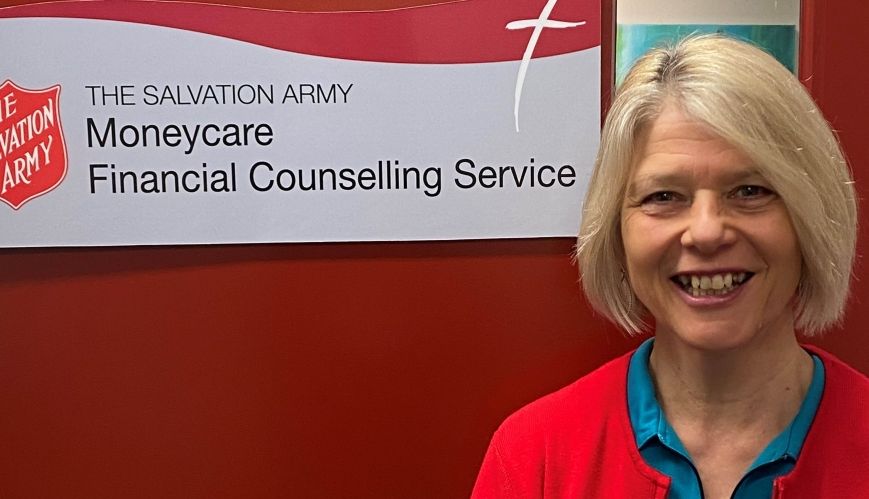Anti-Poverty Week - seeking help early

Anti-Poverty Week - seeking help early
16 October 2022
Salvation Army Moneycare financial counsellor Jeanette Jagfelt says it’s important to seek help early if you find yourself in financial stress.
With rents and mortgages continuing to rise, and budgets stretched due to rising costs of power, petrol and groceries, more of us than ever are under financial stress. Forty-two per cent of Australian families say they are worse off financially than this time last year and 32 per cent expect to be worse off by this time next year.
This Anti-Poverty Week 2022 (16-22 October), Salvation Army Moneycare financial counsellor Jeanette Jagtfelt says it is essential to seek help early if in financial stress because, without support, we may be closer to poverty than we know.
Jeanette recalls the story of Sarah*, a young woman in her mid-20s with twin baby girls. Sarah found herself bombarded by debt collectors while struggling to pay off a loan her ex-husband had taken out to cover his old debts and a new car.
Earlier in the relationship, he had pressured Sarah to add her name and part-time income to the loan application to get it passed. As the marriage turned violent, Sarah left, but her husband kept the car.
Her husband soon stopped contributing to the loan repayments and by the time Sarah’s friend brought her to see Salvation Army Moneycare (free) financial counsellor Jeanette Jagtfelt, Sarah was deeply distressed – financially and emotionally.
Jeanette explains that financial counselling involves helping people who have found themselves in financial stress, often due to circumstances beyond their control. (Support is available for those who may need just one session to work through a budget, but also for those who are facing complex financial issues.)
“Circumstances can change so quickly. People don’t realise how quickly,” she says. “It may be a lost job or not enough hours, mental health, a relationship breakup.”
In Sarah’s case, Jeanette was able to stop the harassing calls and then negotiate with the financial organisation to take Sarah’s name off the loan.
First port of call
Jeanette says it is important to contact Moneycare before the crisis point. “Don’t wait until you get a foreclosure letter,” she says.
In times of severe financial stress, Jeanette explains people often become overwhelmed and feel too ashamed to talk about their struggles.
“Often we are the last port of call, instead of the first, because talking about money struggles can feel shameful and embarrassing. As financial counsellors, we try to ease that. It is confidential, it’s non-judgmental, and it’s a free service. That’s what we’re here for. We can explain what rights [people] have available,” Jeanette says.
“Reaching out early can avoid a lot of heartache. It means more options, and we can give support and referrals early on. It might be stopping the debts, putting them on hold or stopping debt collectors chasing them.”
Care in tough times
As well as working from her base in the Newcastle (NSW) area, Jeanette has been “privileged” to spend time working in the NSW disaster recovery centres located on the South Coast after the Black Summer bushfires and after the floods in the Hawkesbury and Northern Rivers regions.
“In disaster recovery, you see such difficult and painful situations. Until I went to those areas, I didn’t fully realise the impact [of natural disasters]. The people were so grateful to be supported and heard. I felt so fortunate to be the one who gets to distribute the donated funds,” she says.
While there are many sad stories, Jeanette also sees great hope grow. She says: “The highlight of my role is seeing people more empowered, even after their first session.
“Although we sometimes can’t give [community members] the options they were hoping for, they feel more in control, and they feel heard and that they don’t have to carry the burden alone. Often when people first come to us, they’re genuinely sad and without hope. However, by the time they leave, generally they feel that some hope has been returned and the stigma and shame about coming to talk to someone about their circumstances has eased.
“We understand that it takes courage to come and talk to us early – it’s so important. Even if you just want a simple financial health check; there doesn’t have to be a major reason. Come anyway!”
For assistance, go to: https://www.salvationarmy.org.au/get-involved/anti-poverty-week/
*Some details changed for privacy.
Comments
No comments yet - be the first.